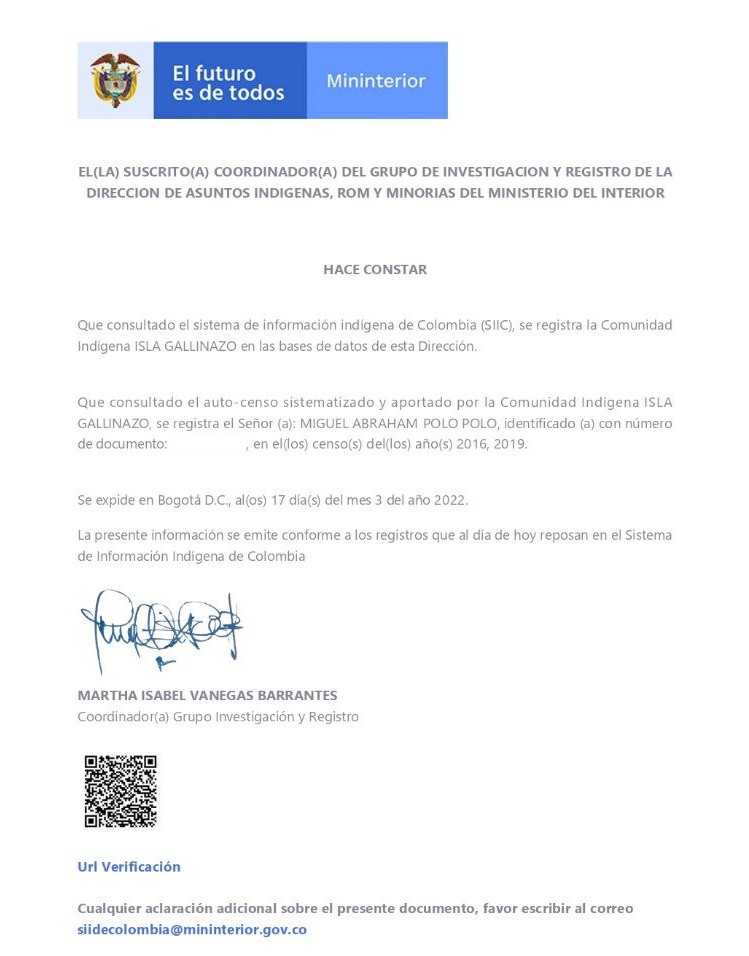
The election of Miguel Polo Polo as an Afro-descendant representative of the House added to the long list of controversies surrounding these special seats of the Congress of the Republic. In addition, for some controversial statements he gave in a radio interview, to which he added a previous recognition in which he identified himself as indigenous.
Ali Bantú, a candidate on the list of Soy por Somos (a movement of which Francia Márquez is also part) for the Afro-descendant seat but who was not elected, shared on his social networks that the elected representative was recognized among indigenous minorities.
The document issued by the Colombian Indigenous Information System (SIIC), of the Ministry of the Interior, certifies that Miguel Abraham Polo Polo appeared as belonging to the census of the Isla Gallinazo Indigenous Community in the 2016 and 2019 records.

Through QR Code verification, the authenticity of the document can be verified. Although it is not established that a person cannot belong to two minorities, Polo Polo has been rightly questioned for not identifying himself in the activism of the Afro community.
“Mr. @MiguelPoloP is indigenous, not black. In 2019, this boy “self-perceived” as an indigenous person in the Isla Gallinazos community to win a scholarship (attached queen test). As a result, this man does not meet the requirements to be elected by the Afro Chamber,” said the candidate Bantu.
Law 649 of 2001 establishes as the only requirement for aspiring to the seat of black communities that candidates for election “must be members of the respective community and previously endorsed by an organization registered with the Directorate of Black Communities Affairs of the Ministry of the Interior”.
In addition to general inabilities to aspire to public office, there are no problems related to double minority recognition. However, Polo Polo is questioned because of the identity with the communities it claims to belong and which it aspires to represent.
Regarding the new question, Polo Polo responded on his Twitter account, only with regard to the scholarship, but not to ethical questions. “After graduating from high school in 2013, I entered the University of Cartagena in 2016 through an admission exam, where I took my Undergraduate Degree in Public Management. In 2021, the American Colombo awarded me a scholarship to study English. I have never been a fellow as an indigenous person,” he said.
In an interview with W Radio, against which he announced legal action, the elected representative stated that being Afro or indigenous, supposedly legally, means self-recognition as such. “All the Colombian people have something afro in their DNA, so in that order of ideas, coming to say that I do not represent the Afro struggle is something that is out of the hair,” he said.
Polo Polo also described as “hodgepodge” and “mazamorra” the miscegenation with afros and indigenous genes, besides that it does not defend “collective rights, I don't like collectivism, I defend individual rights”, so his proposals will not be focused on minorities.
According to a document entitled Representation, Participation and Special Seats for Ethnic Minorities of the Registrar's Office and Centre for Studies in Democracy and Electoral Affairs, the two seats of African descent have been involved in questions of representation for several years.
The study points out that since the reactivation of the seats in 2002, there has been no unanimity of community councils of Afro-descendants by those elected. In that year, María Isabel Urrutia and Willington Ortiz were left, renowned for their sporting achievements, but little for their political significance.
Urrutia was elected again alongside Silfredo Morales Altamar, who ended up convicted of corruption at the end of the four-year period. In 2010, Yahir Fernando Acuña was elected, questioned for being sponsored by Enilce López alias 'La Gata'. In 2014, the elected Maria del Socorro Bustamante and Moisés Orozco Vicuña were unknown to the black communities.
According to the document, one of the basic problems is the absence of a community organization of black populations, which in many cases are not recognized as such, so that representatives who are part of a tradition in the Afro struggle do not get the support to be elected and those who are supported by political clans achieve this. .
In contrast, in the indigenous seat, the requirements for candidates are that “they must have held a traditional position of authority in their respective community or have been the leader of an indigenous organization, a quality that will be accredited by a certificate of the respective organization endorsed by the Ministry of the Interior”.
KEEP READING:
Últimas Noticias
Debanhi Escobar: they secured the motel where she was found lifeless in a cistern
Members of the Specialized Prosecutor's Office in Nuevo León secured the Nueva Castilla Motel as part of the investigations into the case

The oldest person in the world died at the age of 119
Kane Tanaka lived in Japan. She was born six months earlier than George Orwell, the same year that the Wright brothers first flew, and Marie Curie became the first woman to win a Nobel Prize

Macabre find in CDMX: they left a body bagged and tied in a taxi
The body was left in the back seats of the car. It was covered with black bags and tied with industrial tape
The eagles of America will face Manchester City in a duel of legends. Here are the details
The top Mexican football champion will play a match with Pep Guardiola's squad in the Lone Star Cup

Why is it good to bring dogs out to know the world when they are puppies
A so-called protection against the spread of diseases threatens the integral development of dogs



